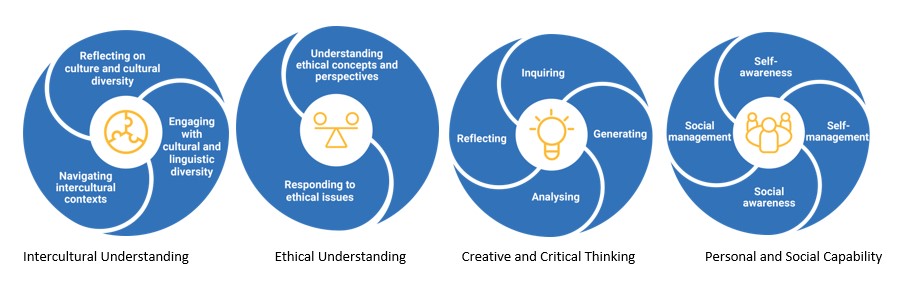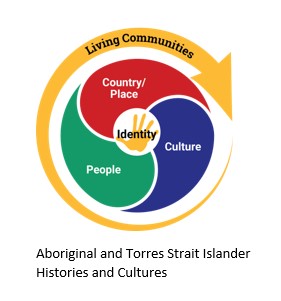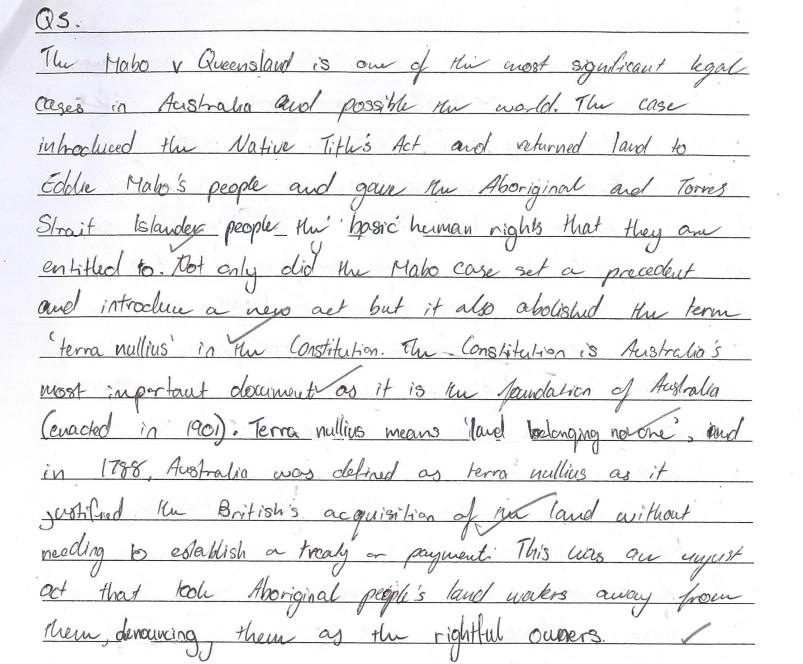Year 12 – Social and Community Studies (CC BY)
Subject overview
Social and Community Studies Applied Senior Syllabus (2019)
Elective: Legally, it could be you
Social and Community Studies is a four-unit course of study. Social and Community Studies Applied syllabus deals with the skills students need to function efficiently and positively in current and future life roles. It cultivates appreciation of, and respect for, cultural diversity and encourages responsible attitudes and behaviours required for effective participation in the community and for thinking critically, creatively and constructively about their futures. (Queensland Curriculum and Assessment Authority [QCAA], 2019). This elective examines the civic rights and obligations of young school leavers. During the semester long course of study, students conduct social investigations.
Core concepts and ideas
- The law is part of daily life and influences and determines a person’s choices.
- Knowledge of the law is necessary in order to operate effectively as a member of society.
- The law establishes rights and responsibilities to regulate how individuals and groups behave in society.
- Empathising with different perspectives within various social contexts allows an understanding of laws to develop through connectedness to the world and others.
Knowledge, understanding and life skills
Personal Skills
- A person’s self-concept and self-esteem are moulded by their experiences
- An ability to plan, organise, manage and make efficient and effective use of time and resources is essential for personal development
- Integrity, values, self-discipline, and social responsibility benefit self-growth
- A person’s aspirations determine many important lifelong decisions and involve setting personal goals and devising strategies to attain them
Interpersonal Skills
- Relationships with others are influenced by various social contexts
- Relationships change as people grow and develop
- Interpersonal skills are integral to building positive relationships with other people
- Interpersonal communication shapes how a person is perceived in the real world
Citizen Skills
- Active citizenship in the community ensures that a person contributes to the society in which they live
- Empathy with different perspectives within various social contexts is developed by connectedness to the world and others
- Active citizenship sustains quality community
Curriculum links
This resource is aligned with the Queensland Curriculum & Assessment Authority Version 1.0 and the Australian Curriculum Cross-Curriculum Priority: Aboriginal and Torres Strait Islander Histories and Cultures.
Underpinning factors
- Applied learning
- Community connections
- Core skills for work
- Literacy
- Numeracy
General capabilities

Cross-curricular priorities

Inquiry skills
Inquiry skills are used by students in each module of work and are developed by students engaging in the inquiry process in both learning and assessment experiences. Building on students’ prior knowledge and experience, an inquiry generally follows a sequence of phases including:
- define rights, responsibilities and human rights using research strategies, investigations, projects and establishing questions
- apply and examine The Declaration of Human Rights and its purpose. Organise and analyse evidence, information and date and evaluate validity of evidence
- synthesise- interpret and use information from a variety of sources to investigate how we learn about our rights and responsibilities, how other countries operate in terms of human rights, who protects human rights, and how human rights are protected in Australia
- reflect and produce – formulating opinions and arguments, producing evidence or taking action about human rights abuses across the globe and within Australia and ways active citizens can help protect human rights
- evaluate and justify- the systems in place in Australia that protect human rights
- reflect and appraise significant human rights cases in Australia and their impact including Mabo v Queensland (No.1 and No. 2) (racial discrimination) reconsidering consequences and outcomes of each of the identified phases.
Lesson Plan
Topic |
Lesson Plan |
Resources |
|
Do you know your rights? |
Define:
Discuss:
Activity:
|
Australian Human Rights Commission. (n.d.). Brochures- know your rights. https://tinyurl.com/56v9nwd3 Dzehtsiarou, K. (2021). Compulsory vaccination: What does human rights law say? The Conversation. https://tinyurl.com/5n8uyycn Gjelton, T. (2018). Boundlessly idealistic, Universal Declaration of Human Rights is still resisted. NPR. https://tinyurl.com/h9yj2p3j Simons, M. (2021). We need to think about post-lockdown rights. The Monthly. https://tinyurl.com/mr4zm8py United Nations. (n.d.). Protect human rights. https://www.un.org/en/our-work/protect-human-rights
|
|
What are Human rights and why are they important? |
Define:
Discuss:
Activity: Look at
Watch:
|
Australian Human Rights Commission. (2018). What are human rights? [Video]. YouTube. https://youtu.be/WJsUfck01Js Australian Human Rights Commission (2021). ‘From dreams, let’s make it a reality‘ [Video]. YouTube. https://youtu.be/EwU64-keBaE United Nations Human Rights. (2012). A path to dignity. [Video]. YouTube. https://youtu.be/ahE0tJbvl78 Wenz, K. (2020). What if a single human right could change the world? [Video]. TED Conferences. https://tinyurl.com/2p8u6fes
|
|
How Human rights are protected in Australia
Universal Declaration of Human Rights |
Define:
Discuss:
Activity:
|
Attorney-General’s Department. (n.d). Human rights protections. https://tinyurl.com/s8pezkve Australian Human Rights Commission. (n.d.). How are human rights protected in Australian law? https://tinyurl.com/pxvar5bn
Australian Human Rights Commission. (n.d.). Universal Declaration of Human Rights: Human rights at your fingertips. https://tinyurl.com/kdbkttbc
|
|
Human rights cases in Australia |
Define:
Discuss:
Activity: Research Questions:
|
Australian Institute of Aboriginal and Torres Strait Islander Studies. (2008). Case summary: Mabo v Queensland. https://aiatsis.gov.au/publication/35464 Department of Local Government, Sport and Cultural Industries. (n.d.). Right wrongs: ’67 Referendum – WA 50 years on. https://tinyurl.com/3dnhz3rv James Cook University Library. (2022). Eddie Koiki Mabo: A timeline of history in the making. James Cook University Open eBooks. https://tinyurl.com/mt9k9r2z |
|
Indigenous peoples and Human rights |
Read:
Discuss:
Activity:
|
Australian Human Rights Commission. (n.d). Department of Economic and Social Affairs Indigenous Peoples. (2007). UN Declaration of the Rights of Indigenous Peoples. United Nations. https://tinyurl.com/2s5tjk74
|
|
Summary and revision |
Define:
Discuss:
Activity:
|
Amnesty International. (n 2018). Learning about human rights in the secondary school. https://tinyurl.com/yc7e8m64 ABC news. (2022). UN Human Right Council appoints independent expert to keep tabs on Russian rights violations. https://tinyurl.com/2cwh9pps
|
| Practice Exam |
Practice exam question: How do the Mabo v Queensland cases highlight racial discrimination, human rights abuse and the power of individuals to make change for the betterment of others?
|
|
| Assessment | Examination
Purpose: This technique assesses the application of a range of cognition to provided questions, scenarios and/or problems. Responses are completed individually, under supervised conditions and in a set timeframe. Dimensions to be assessed: This assessment technique is to be used to determine student achievement in objectives from both of the following dimensions:
Short response test: Short response tests typically consist of a number of items that may include students responding to some or all of the following activities:
Respond to questions or stimuli about short legal and citizenship scenarios. Example stimuli: Mabo v Queensland (No.1) Before the High Court had considered Eddie Mabo’s claim that he had native title over his traditional lands in the Torres Strait, the Queensland Government passed a law extinguishing all native title in Queensland. The High Court found that, on the assumption that Indigenous people did have title to their traditional land, the Queensland law was discriminatory because it took away property rights from Indigenous people and not from anybody else. The High Court later went on to consider whether, under Australian law, Indigenous people did have title to their traditional land – a matter decided in the famous case of Mabo v Queensland (No.2). Exam Question: Explain the significance of the Mabo v Queensland ( No. 1 and No. 2) cases to Australians with reference to human rights.
|
|
Example student high level response

Transcript:
The Mabo v Queensland is one of our most significant legal cases in Australia and possibly, the world. The case introduced the Native Title’s Act and returned land to Eddie Mabo’s people and gave the Aboriginal and Torres Strait Islander people their basic human rights, that they are entitled to. Not only did the Mabo case set a precedent and introduce a new act but it also abolished the term terra nullius in the Constitution. The Constitution is Australia’s most important document as it is the foundation of Australia (enacted in 1901). Terra nullius means land belonging to no one, and in 1788, Australia was defined as terra nullius as it justified the British aquisition of the land without needing to establish a treaty or payment. This was an unjust act that took Aboriginal people’s land and waters away from them, denouncing them as the rightful owners.
Source: United Nations. (n.d). Universal Declaration of Human Rights

